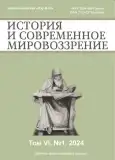Approaches of Russia and Turkey in Strengthening Regional Security in the Middle East and Central Asia in the Second Half of the 20th and the First Quarter of the 21st Centuries
- Authors: Pospelov N.V.1
-
Affiliations:
- Diplomatic Academy of the Russian Ministry of Foreign Affairs
- Issue: Vol 6, No 1 (2024)
- Pages: 106-112
- Section: DEBATING ISSUES OF GENERAL HISTORY AND INTERNATIONAL RELATIONS
- URL: https://journals.eco-vector.com/2658-4654/article/view/630562
- DOI: https://doi.org/10.33693/2658-4654-2024-6-1-106-112
- EDN: https://elibrary.ru/OBWUOA
- ID: 630562
Cite item
Abstract
The article considers the problem of regional security which is on the agenda of the international community. Russia and Turkey as two politically and economically interconnected countries have a rich history of relations. The Middle East and Central Asia where their national interests overlap are priority directions at the present stage. However, disagreements in conflict resolution do not allow reaching a compromise and entering a new level of interaction. At the beginning of the 21st century Russia and Turkey showed an interest in strengthening regional security and achieving peace and stability. Although the incident in November of 2015 slowed down the development of cooperation and caused the refusal to maintain friendly contacts Moscow and Ankara realized the need to overcome differences and follow the provisions of concluded treaties and agreements. The beginning of a special military operation in Ukraine on the 24th of February of 2022 showed their complex and ambiguous interaction in the Middle East and Central Asia. The aim of the article is to identify the approaches of Russia and Turkey in strengthening regional security.
Keywords
Full Text
About the authors
Nikita V. Pospelov
Diplomatic Academy of the Russian Ministry of Foreign Affairs
Author for correspondence.
Email: nikpos96@bk.ru
ORCID iD: 0000-0002-2225-6774
SPIN-code: 8043-9170
Scopus Author ID: 1138802
Postgraduate Student
Russian Federation, MoscowReferences
- Abalian A.I. Middle Eastern Policy of the Russian Federation in the Post-Soviet Period: Dynamics of Development // Political Expertise: POLITEX. — 2020. — Volume 16. — № 2. — Pp. 263–281.
- Avatkov V.A., Krylov D.S. Russia’s Foreign Policy Ideologemes and Their Relevance for Middle East in Context of Transformation of Modern System of International Relations // RUDN Journal of Political Science. — 2023. — Volume 25. — № 1. — Pp. 163–174.
- Bdoyan D.G. Russian-Turkish Contradictions in the Middle East // Scientific and Analytical Journal «Observer». — 2017. — № 6 (329). — Pp. 23–33.
- Vedeneev I.N. Prospects for the Invasion of Turkey and Iran against the Kurds of Syria and Iraq (before the End of 2022) // Oriental Courier — 2022. — № 4. — Pp. 49–54.
- Gaber E. Turkey in the Caucasus and Central Asia: the Post-Soviet Period // Central Asia and the Caucasus. — 2011. — Volume 14. — № 3. — Pp. 159–170.
- Qasimli M.J. USSR — Turkey: From Normalization of Relations till New Cold War (1960-1979). — M.: «Insan», 2008. — 576 p.
- Kasyanenko A.V. Military-Political Relations between Russia and Turkey in the Context of the Kazakhstan Crisis of Winter 2021-2022 // International Relations. — 2022. — № 4. — P. 81–95.
- Kobrinskaya I.Ya., Vartazarova L.S., Utkin S.V. Modern Turkey: Development Trends and the Meaning for Russia. — M.: IMEMO RAS, 2019. — 54 p.
- Kojaman O. Post-Soviet Transcaucasia in Russian-Turkish Relations // Russia and the Muslim World. — 2004. — № 2. — Pp. 56–64.
- Pakhomova D.A. Turkey and the Iraqi Crisis of 2003 // Global and Regional Security in the XXI Century. Materials of Scientific Conferences. Responsible editor V.I. Mikhaylenko. — E.: Ural Federal University, 2014. — Pp. 191–195.
- Romanova N.P., Kononov S.V., Zhukov A.V., Zhukova A.A. Evolution of the Concept «Regional Security» in the World Political Science // Transbaikal State University Journal. — 2021. — Volume 27. — № 1. — Pp. 66–74.
- Svistunova I.A. Russian-Turkish Relations in the Middle East, 2002-2012 // Russian-Turkish Relations: 2002-2012. Materials of the Round Table. Series: Books and Brochures IMI. Volume 25. Responsible editors V.A. Avatkov, S.B. Druzhilovsky, A.V. Fedorchenko. — M.: MGIMO University, 2013. — Pp. 116–125.
- Suleymanov A.V. Ataturk’s Political Ideology // Bulletin of Perm University. Political Science. — 2015. — № 2 (30). — Pp. 37–45.
- Troitsky E.F. Turkey’s Policy in Central Asia (1992-2000) // Tomsk State University Journal. — 2009. — № 328. — Pp. 84–88.
- Bayat Ş. 2008 Osetya Krizi Sonrası Türkiye’nin Transkafkasya Politikası // T.C. Niğde Ömer Halisdemir Üniversitesi Sosya Bilimler Enstitüsü Avrasya Araştırmaları Anabilim Dalı. — N.: Yüksek Lisans Tezi, 2021. — 64 s.
- Hill F., Taşpınar O. Russia and Turkey in the Caucasus: Moving Together to Preserve the Status Quo? // Russie.Nei. Visions n08. Research Programme Russia/CIS. — P.: Institut Français des Relations Internationales, 2006. — 19 p.
- Inaç H., Hadjı A. Turkey and Russia in Central Asia after 2003: The Shift from a Strategy of Competition and Conflict to a Strategy of Cooperation and Partnership // Uluslararası Yönetim Akademisi Dergisi. — 2022. — Cilt 5. — № 3. — Ss. 499–509.
- Rüma I., Çelikpala M. Russian and Turkish Foreign Policy Activism in the Syrian Theater // Uluslararası Ilişkiler. — 2019. — Volume 16. — № 62. — Pp. 65–84.
- Suyundikov S. Dağlık Karabağ Savaşı’nın Çözümü Bağlamında Türkiye ve Rusya // Uluslararası Tarih Araştırmaları Dergisi. — 2021. — Cilt 5. — № 1. — Ss. 132–145.
- Trenin D. From Damascus to Kabul: Any Common Ground between Turkey and Russia? // Insight Turkey. — 2013. — Volume 15. — № 1. — Pp. 37–49.
Supplementary files








